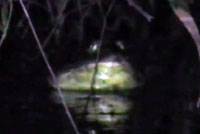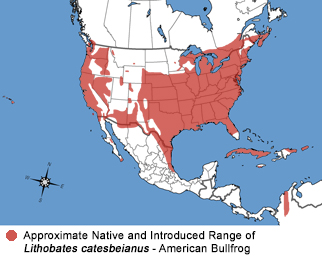
|
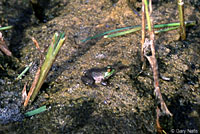 |
 |
|
Adult, Agua Caliente,
Baja California Sur |
Adults, Agua Caliente,
Baja California Sur |
|
| |
|
|
| Habitat |
 |
| Habitat, Agua Caliente, Baja California Sur |
| |
| Short Videos of this Species |
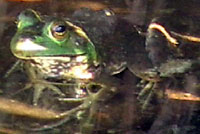 |
|
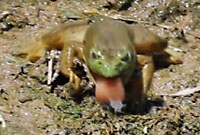 |
| Views of several bullfrogs in ponds and creeks in the U.S.A. |
A large male Bullfrog calls at night from a lake in Santa Cruz County, Arizona, U.S.A. |
A bullfrog on the edge of a small pond tries to grab a bug with its tongue and fails, but succeeds on the second try, then jumps into the water to finish it off. |
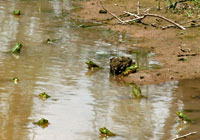 |
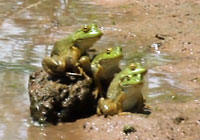 |
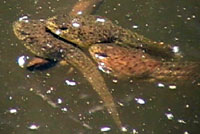 |
| Hundreds of bullfrogs make their frightened chirping sounds as they jump in and out of the water, or run across the surface to escape from danger. |
Bullfrogs sitting around a crowded pond interact with each other, making chirping sounds and other noises. |
Although they are quick to swim to the bottom when first approached, American Bullfrog tadpoles will usually calm down and resuface, where they slowly swim, float, and socialize. |
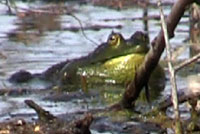 |
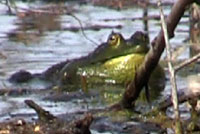 |
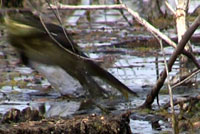 |
A big male bullfrog calls from the edge of a lake in the daytime. He sat making single calls every few minutes, until suddenly lots of other bullfrogs began calling all around him and then he made longer series of calls. Here we see him start with a full series of calls, then wait a bit before making a second series of calls, but this time starting with some longer notes before doing his typical calls. There was a second male about 10 feet from him who was silent, but after this male makes his second full series of calls, the second male begins calling at 1 minute 10 seconds into the video. We can't see him, but he is about as loud as the first frog. You hear him when you can see that the first frog is silent. The second male's calling disturbed this frog so much, he made a short, sharp, territorial call and leaped in the air in the direction of the second frog. He landed closer to the second frog, but the second frog hadn't moved.
|
This is a very short version of the first series of calls heard in the long video. |
This is also from the long video - the short, sharp, territorial call made just before the frog leaps toward the other male. |
| |
|
|
References:
Grismer, L. Lee. Amphibians and Reptiles of Baja California, Including Its Pacific Islands and the Islands in the Sea of Cortés. The University of California Press, 2002.
McPeak, Ron H. Amphibians and Reptiles of Baja California. Sea Challengers, 2000.
Samuel M. McGinnis and Robert C. Stebbins. Peterson Field Guide to Western Reptiles & Amphibians. 4th Edition. Houghton Mifflin Harcourt Publishing Company, 2018.
Stebbins, Robert C. A Field Guide to Western Reptiles and Amphibians. 3rd Edition. Houghton Mifflin Company, 2003.
The Reptile Database
San Diego Natural History Museum
|
|









